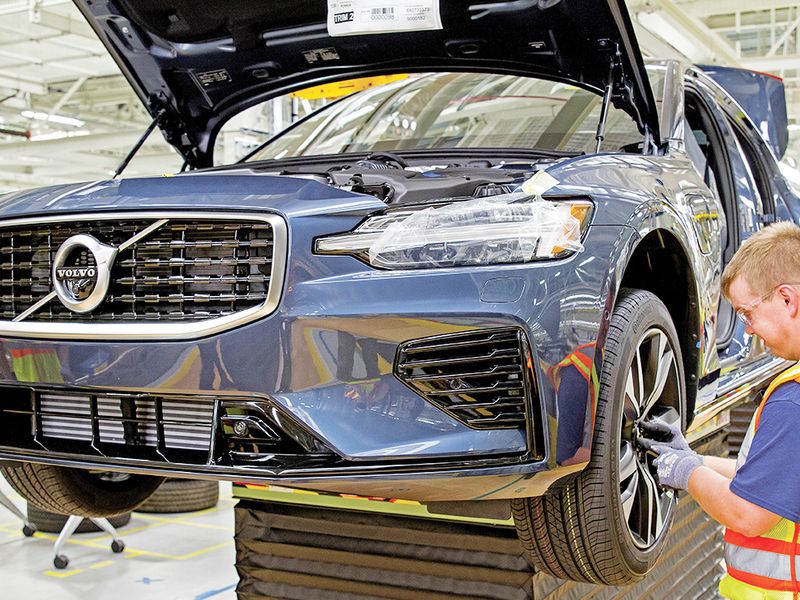
In the battle for talent, a small automaker has pulled out the big guns.
Starting this month, Volvo Cars is providing six months of paid parental leave to its employees, including factory workers, globally.
The benefit sets a benchmark for the auto industry in the U.S. and gives the Swedish automaker a competitive edge in the race to attract the best minds.
Michelle Andersen, who leads Boston Consulting Group’s automotive group in North America, referred to Volvo’s new benefit plan as a “flagship move.”
“There is a real fight for talent,” Ander sen said. “Automakers used to compete more with traditional industrial companies — now they are competing more with technology companies and startups.”
For Volvo, a generous parental leave policy serves as a differentiator in the tussle for talent.
Volvo’s benefit is “unprecedented in the U.S.,” said Jonathan Grosso, senior vice president at talent services and consulting company Modis. “This will open up new talent acquisition channels for Volvo,” Grosso said. “They’ll have a more robust employer value proposition.”
That is precisely the intent, said Volvo Car USA CEO Anders Gustafsson.
“This is a very, very competitive industry,” he told Automotive News. “I need to be able to attract the best.”
But it’s not just about luring that talent, he added. Soft benefits, such as paid parental leave, also keep hard-to-find employees from bolting for a better paycheck.
“You can hire them fast, but they can leave fast, too,” Gustafsson said. “It is really about — can we make sure our people are staying in the company?”
Paid parental leave is offered by 24 percent of U.S. employers, according to the Society for Human Resource Management.
But Volvo’s new Family Bond policy more than triples the six weeks of fully paid parental leave Volvo offered in the U.S. to 19 weeks. Volvo employees can opt for the full 24 weeks at 80 percent of their salary.
The benefit is offered to everyone, and it can be taken within the first three years of parenthood. At the end of the leave period, the employee can return to the same job.
The policy includes adoptive, foster care and surrogate parents, as well as non-birth parents in same-sex couples.
“We want to be inclusive,” Gustafsson said. “We would like to be a very attractive company to work for.”
The new perk is richer than parental benefits offered by some U.S. automakers.
General Motors offers U.S. employees up to 12 weeks of paid parental leave.
Ford Motor Co. offers new parents eight weeks of paid time off, with new mothers receiving an additional six to eight weeks of paid disability leave.
Volvo’s benefit has, no doubt, captured the attention of HR leaders across the automotive landscape.
“It will result in some rethinking about what flexibility should be built into the benefits package,” Andersen said. There may not be an “apples-to-apples adjustment” on parental leave policies, but it could lead to consideration of other options, such as flexible work models, part-time models and job sharing, she said.
The new benefit comes as Volvo scales up in the U.S., where it employs more than 2,000 salaried and factory workers. Sales have surged by a third in the past five years, and the automaker is expanding its assembly operations near Charleston, S.C.
Gustafsson has this message for his industry peers: “We would like to try to attract good people. So if they don’t take care of their employees, we will probably recruit them.”
Volvo is looking far beyond the auto industry to build tomorrow’s work force.
The automaker expects to become an all-electric brand globally by 2030. That’s going to require the nearly 95-year-old company to reinvent its work force — filling its offices and plants with software developers, computer engineers and data scientists.
Volvo is thinking 10 to 20 years ahead.
“Volvo may be anticipating that, if they plan on moving into more software, technical-driven applications, they’re going to be competing against Google, Facebook, Microsoft,” Grosso said. “This move could raise their employer value proposition very significantly.”
Benefits such as parental leave speak to millennials, many of whom prioritize workplace culture.
“The next generation is less focused on the monetary elements of the job. They are looking for a responsible company that is focused on sustainability, reducing its carbon footprint,” Andersen said.
“Volvo is thinking outside of the traditional monetary offerings.”
More vexing for Volvo is how to keep product development and vehicle assembly on track if key employees stay home for several months. Sometimes this requires building redundancy into the work force and getting creative with job sharing, Grosso said.
“They could have people sharing multiple roles,” he said.
For strategic jobs, Volvo might bring in a consultant on a six- to nine-month contract.
But Volvo is prepared to deal with extended employee absences.
“In Volvo Cars, you don’t have a job description, you have a purpose that is linked to your department role in the company,” Gustafsson said.
When an employee needs to take extended leave, the team shares the workload where possible. In other cases, Volvo backfills the job with consultants and temporary workers.
Job sharing has a secondary benefit — it helps employees venture out of their comfort zones and expand their skill sets, which also helps with retention, Gustafsson said.
Short term, Volvo might feel some pressure, Grosso said.
“But long term, I would be very surprised if this benefit isn’t proven to be cost-positive,” he said.
“In this situation, a company would be looking at the total cost of employment — talent acquisition, training and replacement.”

